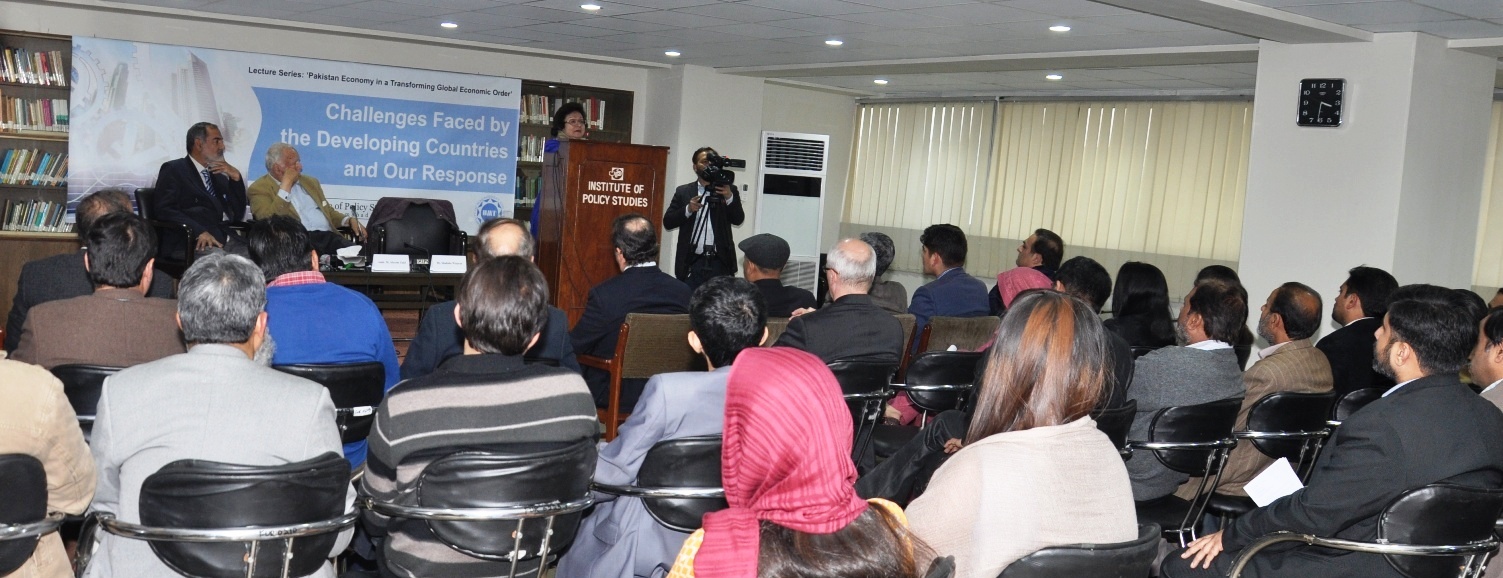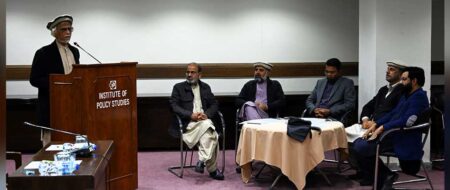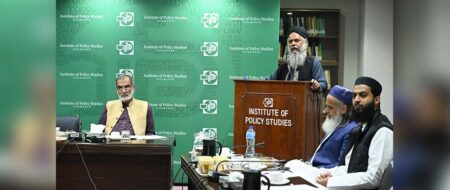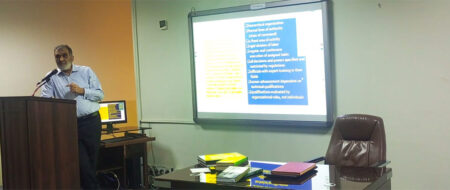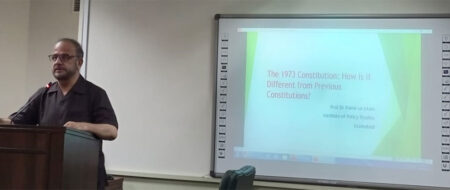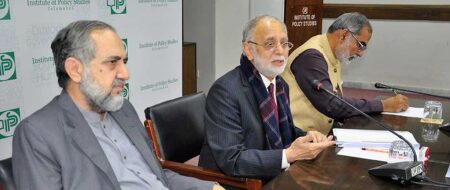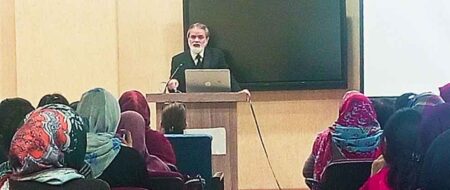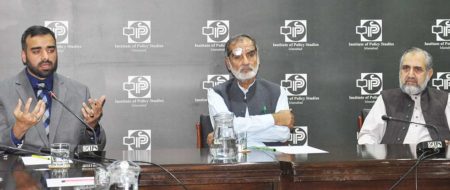Lecture series on ‘Pakistan Economy in a Transforming Global Economic Order’
 As part of its ongoing fellowship program, IPS organized a lecture series by renowned economist Professor Dr Shahida Wizarat on the theme of ‘Pakistan Economy in a Transforming Global Economic Order’ from February 14-17, 2017, at its own premises as well as at three major universities of the federal capital.
As part of its ongoing fellowship program, IPS organized a lecture series by renowned economist Professor Dr Shahida Wizarat on the theme of ‘Pakistan Economy in a Transforming Global Economic Order’ from February 14-17, 2017, at its own premises as well as at three major universities of the federal capital.
Dr Wizarat is former director, Applied Economics Research Centre (AERC), University of Karachi, and currently dean of College of Economics and Social Development (CESD), Director Research and Chief Editor, Pakistan Business Review (PBR), Institute of Business Management (IoBM), Karachi.
The first lecture of the series held at IPS, titled ‘Challenges Faced by the Developing Countries and Our Response’, on February 14, 2017, was chaired by Ambassador (r) M Akram Zaki, senior IPS associate and former secretary-general foreign affairs.
The second lecture was at International Institute of Islamic Economics (IIIE), International Islamic University (IIUI), Islamabad on February 15, 2015 on the topic of ‘Food Security – Global Scenario and Pakistan’. ‘Economic Governance in Pakistan: Issues and Strategies’ was the title of her next presentation held at the Islamabad campus of Bahria University on February 16, 2017.
The series of lecture rounded off with the repeat of the first lecture ‘Challenges Faced by the Developing Countries and Our Response’, this time delivered at the Department of Economics of Quaid-i-Azam University (QAU), Islamabad on February 17, 2017.
 Dr Wizarat, during the course of her lectures, highlighted that many economists in the world today were contesting globalization and were increasingly seeing it as a process of vast, systematic, institutionalized and legitimized plunder of the Third World countries, which have been developed into a condition in which their productive capacity, their land, labour, forests, and fisheries now produce mostly for the benefit of a relatively few rich people elsewhere.
Dr Wizarat, during the course of her lectures, highlighted that many economists in the world today were contesting globalization and were increasingly seeing it as a process of vast, systematic, institutionalized and legitimized plunder of the Third World countries, which have been developed into a condition in which their productive capacity, their land, labour, forests, and fisheries now produce mostly for the benefit of a relatively few rich people elsewhere.
Quoting various economists such as Ukpere, Slabbert, Haines and Trainer she said that there was overwhelming evidence for a positive correlation between globalization, internationalization and unemployment. Their studies show that global unemployment has increased the rate of global inequality and the gap between the “global rich” and the “global poor” continues to grow, she added.
She lamented that Transnational Corporations (TNCs), instead of Third World governments were dictating Third World development, with the latter unable to direct foreign investment towards the needs of their citizens and prevent actions that hurt their national interests. She told that her audience that developed countries exporting GM food to developing countries have very strict laws about the consumption of these food products in their own countries. In most of these countries their consumption is strictly forbidden. She also criticized the recent amendment in Pakistan Seed Act to facilitate GMOs and termed it as a legislative disaster that will have severe effects on the textile sector and food security of the country.
The second biggest challenge, according to Dr Wizarat, the developing countries were faced with was widespread and endemic conflict and militarization. Countries across Asia, Africa, Middle East, etc, were engaged in sectarian, ethnic and ideological conflicts. A common feature of these conflicts was that populations were polarized systematically into ethnic, sectarian and ideological groups with intensities varying in different countries. Some countries were in the fore front, others were somewhere in the middle, where conflict was brewing up, but has yet to result in open warfare. And some were on the back burner where seeds for polarization were now being sown.
Quoting her own study of 2014, she claimed that one percent increase in world conflict increases GDP of developed countries by 7.7 per cent, while resulting in decline in developing countries’ GDP by 3.8 per cent.
The developed countries were thus the major beneficiaries of conflicts that were enveloping the world today on account of increase in the output of the industrial military complex and enabling them to take control of natural resources from Third World countries that do not have the means to protect these.
 The third challenge described by her was on account of limits to growth theory. Quoting Jeffry Sachs, a leading US economist, she said that it would not be sustainable if the developed countries continue to grow at their long-term per capita rate of 1.6 per cent, while the countries in Asia and other parts of the world continue to grow at their spectacular rates resulting in four to six fold increase in world’s GNP.
The third challenge described by her was on account of limits to growth theory. Quoting Jeffry Sachs, a leading US economist, she said that it would not be sustainable if the developed countries continue to grow at their long-term per capita rate of 1.6 per cent, while the countries in Asia and other parts of the world continue to grow at their spectacular rates resulting in four to six fold increase in world’s GNP.
The world population was expected to grow to 10 billion people in 2025. If these 10 billion people follow the rich countries’ food consumption pattern, which takes about 0.5 ha of cropland to produce, we will need 5 billion ha of land for food production; while at present we only have 1.4 billion ha of cropland in use and which was expected to decline further.
She was of the view that limits to the growth model was the biggest challenge to globalization. The limits to growth analysis has given rise to the policy recommendation that the trade-off between the rates of growth of rich western countries and the emerging Asian countries has to be settled at the cost of sacrificing Asian rates of growth. And the best way to achieve this would be through engaging not only Asia, but the entire developing world in conflicts. This was further corroborated by the advice the Rand Corporation gave to the US government to resolve the Great Recession in 2008 by starting a global war. At that time the US was engaged in Afghanistan and Iraq and the Rand Corporation recommended that US engagements in these two countries alone will not be enough to get the global economy out of the deep recession. For if there was a trade-off between the present rates of growth of the advanced western economies and emerging economies in Asia and elsewhere, the best way to stampede the rates of growth of the emerging economies was to engage them in conflicts.
She urged that we, as a nation, should be aware of these facts and preempt the polarization of our country into sectarian, ethnic, ideological and political groups. Each one of us will have to play our role to preempt the polarization, which will be nurtured and fanned by outsiders who benefit from conflict.


